Customer experience is one of the most important considerations for any business, and a factor that can give you a competitive edge in a crowded market.
While you may think that a shining and great product or service would outweigh the drawbacks of a bad CX, according to a Forrester report, 61% of U.S. adults say that they are unlikely to return to a website that does not provide a satisfactory experience, regardless of how good a product is.
In this article, we'll round up some key data around different aspects of customer experience.
Why customer experience matters
- 84% of people say that the experience provided by a business is equally important to the product or service they're using.*
- One in three consumers will walk away from a brand they love after just one bad experience.*
- 65% of US customers find a positive experience with a brand to be more influential than great advertising.*
- 53% of consumers feel brands fail to meet their experience standards.
- Two-thirds of UK consumers can’t remember when a brand experience last exceeded their expectations.
- 76% of people will switch to a competitor if they have just one bad experience
- Meanwhile - again more on the digital experience side - a survey from socPub revealed that 57% of customers wouldn’t recommend a business with a poorly designed website on mobile.
- Further to that, if a website isn’t mobile-friendly, 50% of customers said they would stop visiting it altogether, even if they like the business. The top reason customers switch brands is because they feel unappreciated.
- Companies that earn $1 billion a year will see an average gain of $700 million within three years of investing in customer experience.
- 70% of enterprise CEOs see UX & CX as a competitive differentiator.
- Customers tell an average of nine people about a positive experience with a brand, but they tell 16 people about a negative experience.
Consumer expectations of customer experience
- Customers expect connected journeys, and 76% of customers expect consistent interactions across departments (Salesforce).
- However, 54% say it generally feels like sales, service, and marketing teams don’t share information.
- 74% of customers have used multiple channels to start and complete a transaction.
- 66% of customers expect companies to understand their unique needs and expectations, but 66% say they’re generally treated like numbers.
- According to customers, healthcare, travel and retail are the most customer-centric industries.
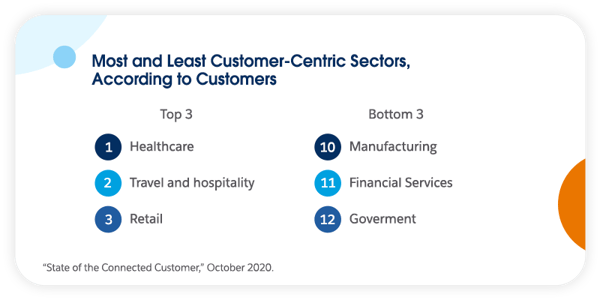
- 53% of consumers feel brands fail to meet their experience standards. (Acquia).

Business attitudes to customer experience
- For the Martech Alliance 2021 Customer Experience Trends & Insights report, we surveyed more than 200 CMOs in the UK, France and Germany. for their views on CX.
- The vast majority (78.5%) agreed that an amazing customer experience provides a powerful competitive advantage.
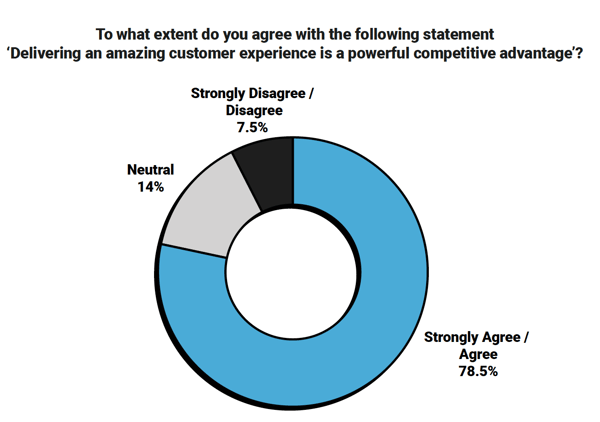
- 31.5% of companies say they are exceeding customer expectations, while 17.5% feel the experience offered meets the needs of customers.
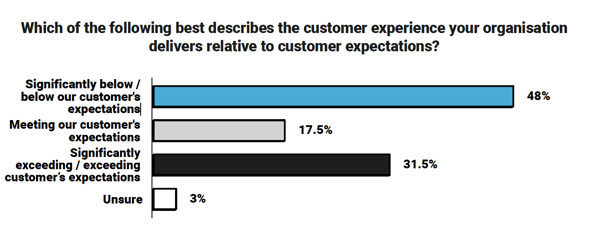
- The main barrier to providing a great customer experience is a lack of skills and knowledge with regards to tech and data (53%), while lacking the necessary tech solutions (43%) was the second biggest obstacle.
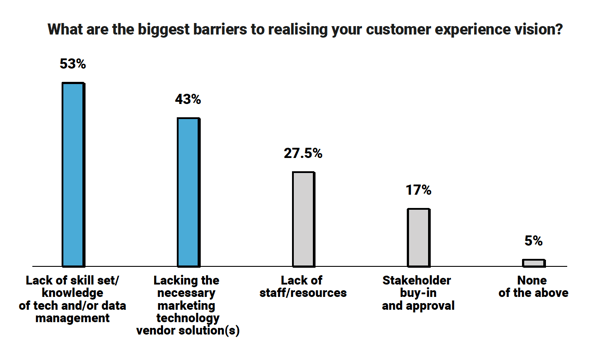
- 48% of companies feel that they fail to meet customer expectations when it comes to CX.
- 54% of UK brands rely on their CMO to set the CX vision for their organisation. (Acquia)
- 44% of UK brands face a brand leadership talent shortage and 23% report confusion on where to start with CX technology.
- A third of companies that ranked CX investment areas as low priorities prior to COVID-19, now plan to spend more.
- 73% of brands can’t provide a consistent experience across their different digital channels
- Fashion sites have the highest proportion of abandonment on mobile (63.03%)
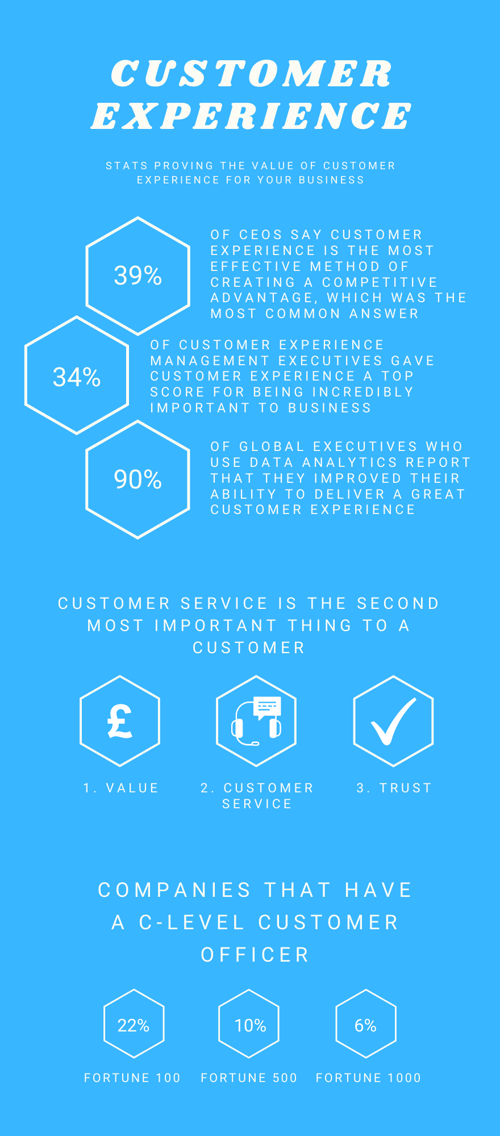
Customer experience and employee engagement
- Companies that excel at customer experience have 1.5 times more engaged employees than less customer-focused companies. In turn, companies with engaged employees outperform the competition by 147%.
- 59% of companies with a CEO who is involved in customer experience report higher revenue growth, compared to just 40% of companies without a customer-focused CEO reporting growth.
ROI from customer experience
- Companies who are advanced at delivering personalised customer journeys report improved retention rates, increased lifetime value (due to repeat visits, personalised marketing and the trust of the individual) and increased sales.
- 88% of companies report that customer mapping had a positive impact on their ability to deliver personalised CX.
- It's relatively common knowledge (or at least a received wisdom) that when people are unhappy, they seem to want people to know. That's why Twitter and YouTube comments are so mean. Generally speaking, the pleased people don't bother saying anything. With that, customers tell an average of nine people about a positive experience with a brand, but they tell 16 people about a negative experience.
- Unsurprisingly, the top 10 most empathetic companies increased their financial value more than twice the bottom 10 companies, and rather handily for you, offering a high-quality customer experience can lower the cost of serving customers by up to 33%.
Customer service
- 90% of Americans use customer service as a factor in deciding whether or not to do business with a company. (Microsoft).
- Almost three out of five consumers say that customer service is key for them to feel loyalty toward a brand. (Zendesk).
- If customer service is excellent, 78% of consumers will do business with a company again, even after a mistake. (Salesforce )
- 58% of Americans will switch companies after a poor customer service experience. (Microsoft).
- Good customer service experience impacts recommendations. Consumers who rate a company’s service as 'good' are 38% more likely to recommend that company. (Qualtrics).
- 93% of customers are more likely to make repeat purchases with companies who offer excellent customer service. (HubSpot).
- Around 50% of customers say they would switch to a new brand after a bad customer service experience. (Zendesk).
- After multiple bad experiences, around 80% of consumers say they would rather do business with a competitor. (Zendesk).
- Customers are four times more likely to switch a competitor if the problem they're having is customer service-based. (Bain and Co).
This post is part of our Martech stats series, which compiles key data and trends. Others include:
